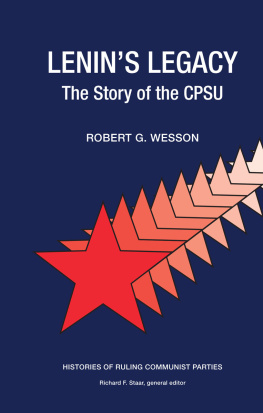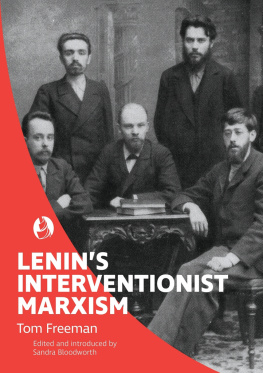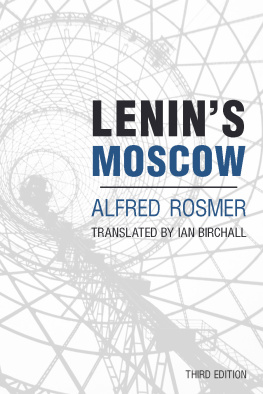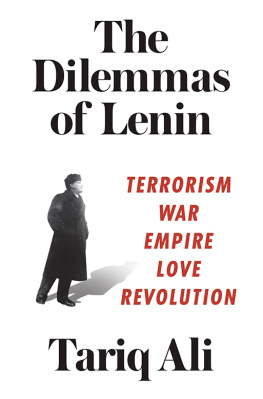Wesson - Lenins Legacy
Here you can read online Wesson - Lenins Legacy full text of the book (entire story) in english for free. Download pdf and epub, get meaning, cover and reviews about this ebook. year: 2017, publisher: Hoover Institution Press, genre: Politics. Description of the work, (preface) as well as reviews are available. Best literature library LitArk.com created for fans of good reading and offers a wide selection of genres:
Romance novel
Science fiction
Adventure
Detective
Science
History
Home and family
Prose
Art
Politics
Computer
Non-fiction
Religion
Business
Children
Humor
Choose a favorite category and find really read worthwhile books. Enjoy immersion in the world of imagination, feel the emotions of the characters or learn something new for yourself, make an fascinating discovery.
Lenins Legacy: summary, description and annotation
We offer to read an annotation, description, summary or preface (depends on what the author of the book "Lenins Legacy" wrote himself). If you haven't found the necessary information about the book — write in the comments, we will try to find it.
Lenins Legacy — read online for free the complete book (whole text) full work
Below is the text of the book, divided by pages. System saving the place of the last page read, allows you to conveniently read the book "Lenins Legacy" online for free, without having to search again every time where you left off. Put a bookmark, and you can go to the page where you finished reading at any time.
Font size:
Interval:
Bookmark:
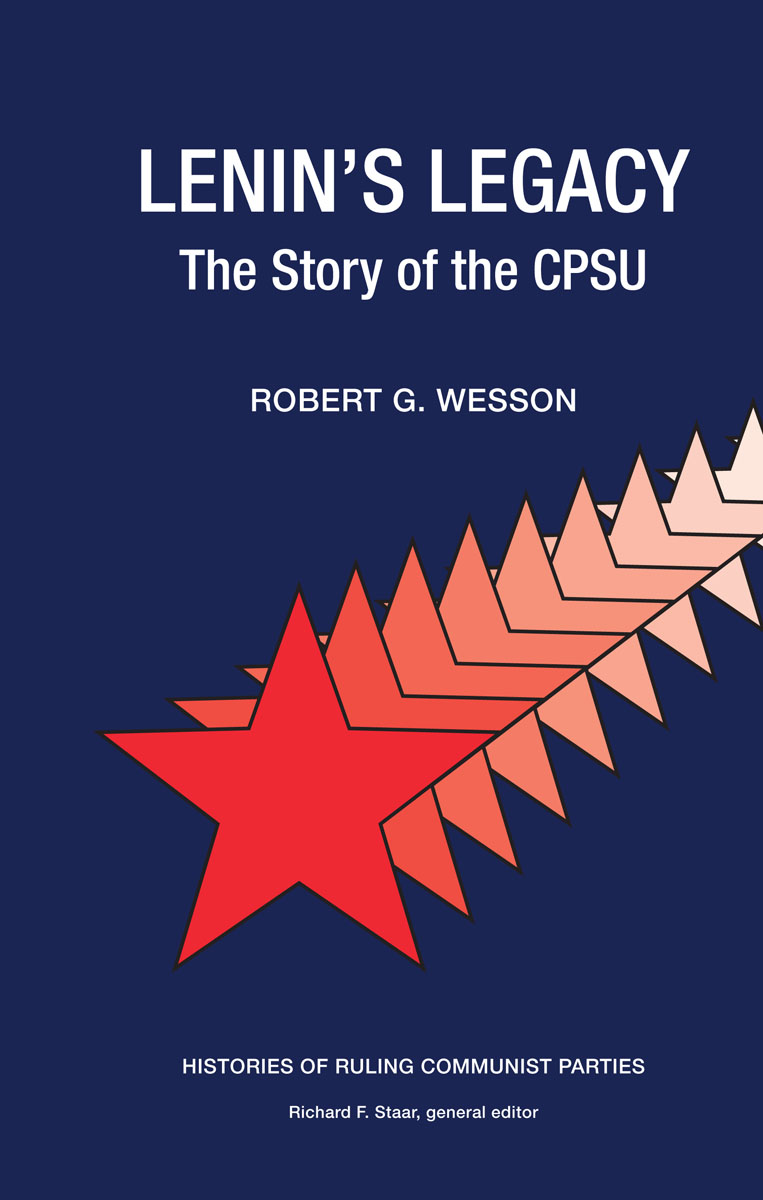

HISTORIES OF RULING COMMUNIST PARTIES
Richard F. Staar, editor
Korean Workers Party: A Short History, Chong-Sik Lee
History of Vietnamese Communism, 1925-1976, Douglas Pike
Lenins Legacy: The Story of the CPSU, Robert G. Wesson
With its eminent scholars and world-renowned library and archives, the Hoover Institution seeks to improve the human condition by advancing ideas that promote economic opportunity and prosperity, while securing and safeguarding peace for America and all mankind. The views expressed in its publications are entirely those of the authors and do not necessarily reflect the views of the staff, officers, or Board of Overseers of the Hoover Institution.
www.hoover.org
Hoover Institution Press Publication No. 192
Hoover Institution at Leland Stanford Junior University,
Stanford, California 94305-6003
Copyright 2017 by the Board of Trustees of the Leland Stanford Junior University
All rights reserved. No part of this publication may be reproduced, stored in a retrieval system, or transmitted in any form or by any means, electronic, mechanical, photocopying, recording, or otherwise, without written permission of the publisher and copyright holders.
For permission to reuse material from Lenins Legacy: The Story of the CPSU, by Robert G. Wesson, ISBN 978-0-8179-6922-6, please access www.copyright.com or contact the Copyright Clearance Center, Inc. (CCC), 222 Rosewood Drive, Danvers, MA 01923, 978-750-8400.CCC is a not-for-profit organization that provides licenses and registration for a variety of uses.
First printing 1978
24 23 22 21 20 19 18 17 10 9 8 7 6 5 4 3
Manufactured in the United States of America
The paper used in this publication meets the minimum requirements of the American National Standard for Information SciencesPermanence of Paper for Printed Library Materials, ANSI/NISO Z39.48-1992.
Cataloging-in-Publication Data is available from the Library of Congress.
ISBN-13: 978-0-8179-6922-6 (paper)
C HAPTER 1
The Russian Discontent
C HAPTER 2
Lenins Party: Formation and Waiting
C HAPTER 3
The Conquest of Power
C HAPTER 4
The Liquidation of Dissent
C HAPTER 5
Stalinism in Power
C HAPTER 6
The Khrushchev Era
C HAPTER 7
Brezhnev and Conservative Communism
This is the third book in a series on the histories of the sixteen ruling communist parties from their organization to the present time. The studies were initiated to fill an important gap in the modern English-language historiography on communism in Albania, Bulgaria, Cambodia, China, Cuba, Czechoslovakia, (East) Germany, Hungary, (North) Korea, Laos, Mongolia, Poland, Romania, the Soviet Union, Vietnam, and Yugoslavia.
This particular volume in the series covers the following aspects of the ruling party in the Soviet Union:
- Social and political background of the revolutionary movement in Russia.
- Founding of the Leninist party, its early struggles, important personalities, polemics, and difficulties.
- Accession to power because of special conditions toward the end of World War I.
- Development of the party from a revolutionary to a governing organization in and after the civil war.
- Stalinist succession; transformation and purge of the party under Stalin.
- The party as an instrument of totalitarian rule, 19301953.
- Succession after Stalin; the Khrushchev interlude of de-Stalinization and qualified liberalization.
- Stabilization of party rule under Brezhnevs leadership, problems in the late 1970s, with an overview of the role and nature of the CPSU, and its relationship to the world communist movement.
As general editor of this series, I am pleased that such a distinguished scholar as Professor Robert G. Wesson accepted our invitation to prepare this monograph.
R ICHARD F. S TAAR
Coordinator of International Studies
Hoover Institution
Stanford University
The Russian Revolution, the interwar period wracked by the struggles between conflicting ideologies, the passions of the Second World War, and the following cold war lose the vividness of living memory with the passing years. As distance grows, the rise of Bolshevism and the Soviet experiment gain clarity, or become less obscure, against the broad horizons of history. It has become easier to see through some of the mystification and to view the party of Lenin, its seizure of power in the worlds largest state, and the subsequent dramatic events in objective focus. The onetime fiery revolutionary state has settled down to sedate maturity, and our view of it should likewise be on the way to settling down.
Detachment is still difficult, because the Soviet state and the Communist movement still base their legitimacy to a large extent on their idealized interpretation of the rise of Lenins party. But at the distance of sixty years the Russian Revolution has lost much of its apocalyptic aura, diabolical or saintly; we can now see it as it has always been in reality, an episode of Russian history, an eruption not of wholly new forces but of old forces in new shapes, not a total overthrow and renewal but a remaking of the Russian polity under the impact of modernization and the strains of maladjustment and war, a result of the long-term abrasive interaction of Russia and the West. The new Russia has always contained much of the old Russia, and Lenins men were Russian revolutionaries far more than they were Marxist radicals. This obvious but frequently neglected fact forces itself ever more strongly on the student as the postrevolutionary government, with its fondness for stability, its modest growth rate, flagging technology, discontented intellectuals, and reliance on pressure more than terror, comes to look more like the prerevolutionary state.
It is consequently appropriate at this time to take a new look at the Leninist party as it rose from a minor radical movement torn by factional squabbles to a governing power, presided over the remaking and industrialization of Russia, fought its way to victory in Russias greatest war, and accommodated to stability. On the one hand, the present history continues the story from where the able accounts of such scholars as Leonard Schapiro and John S. Reshetar, Jr., left it some years ago to cover the Brezhnev period. On the other hand, the perspective of the present day seems to require some shifts of emphasis. This work offers no new discoveries but sees many things differently from previous depictions.
Much is still mysterious, largely because those in a position to publish the truth have frequently preferred persuasion to objectivity, and because one can make only surmises about many important matters. But the story that emerges is a tremendous dark epic, a tale of magnificent achievement and horrible suffering, of nobility and crime; to convey its dramatic grandeur requires the sweep of a Tolstoy plus the psychological insight of a Dostoyevsky. It is of a piece with Russian history, in which the vast success of four hundred years of empire building was shadowed by the sufferings of the people and the misdeeds of the rulers. Peter not only built monumentally but murdered on a scale almost worthy of Stalin, and the shiny new capital of St. Petersburg cost the lives of tens of thousands of serfs. Whether under tsars or general secretaries, Russia has never been a land of moderation.
Next pageFont size:
Interval:
Bookmark:
Similar books «Lenins Legacy»
Look at similar books to Lenins Legacy. We have selected literature similar in name and meaning in the hope of providing readers with more options to find new, interesting, not yet read works.
Discussion, reviews of the book Lenins Legacy and just readers' own opinions. Leave your comments, write what you think about the work, its meaning or the main characters. Specify what exactly you liked and what you didn't like, and why you think so.

